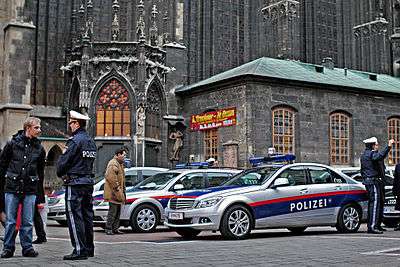Crime in Austria
Crime in Austria is combated by a range of Austrian law enforcement agencies.
Crime by type
Murder
In 2014, Austria (with a population of about 8.5 million) had an intentional homicide rate of 0.5 per 100,000 population.[1] There were a total of 40 intentional homicides in Austria in 2014, the last year of available UN data.[1]
Theft
Pickpockets and purse snatchers can be found in the highly populated areas, including areas frequented by tourists, bus and train stations, and on subways.[2] Residential burglaries are a significant concern, especially in the more affluent areas.[3] The US government rates Vienna as being "medium" for levels of residential crime.[4]
In 2004 Austria had the lowest rates of car theft in the EU.[5]
Corruption
Austria has a well-developed institutional and legal system, and most corruption cases under investigation by a parliamentary committee end with judicial trials and effective judgments. Several significant Austrian corruption cases took place during the 2000s involving land and regional officials, high-level public officials, the central government and, in one instance, the former Chancellor.[6]
In most cases, corrupt practices were related to conflicts of interest, abuse of office, money laundering and influence peddling. The corruption scandals have put into doubt the ethical standards of the political elite.[7] This doubt is reflected in the findings of Eurobarometer 2012, where two-thirds of respondents perceive national politicians to be corrupt and also the most corrupt institution in Austria.[8]
Crime dynamics
Austria is targeted by foreign criminals, with 64 percent of drug-related offences being carried out by criminals who are born overseas.[9] According to British criminal Colin Blaney in his autobiography Undesirables, British thieves and confidence tricksters have targeted Austria on account of the fact that it is viewed as a soft touch due to its relatively low crime rates.[10]
By location
Most criminal activity is focused in the larger metropolitan areas.[11]
References
- 1 2 Global Study on Homicide. United Nations Office on Drugs and Crime, 2013.
- ↑ "Austria 2012 Crime and Safety Report", United States Department of State, Overseas Security Advisory Council, 13 March 2012.
- ↑ "Austria 2012 Crime and Safety Report", United States Department of State, Overseas Security Advisory Council, 13 March 2012.
- ↑ "Austria 2012 Crime and Safety Report", United States Department of State, Overseas Security Advisory Council, 13 March 2012.
- ↑ "The Burden of Crime in the EU, A Comparative Analysis of the European Survey of Crime and Safety (EU ICS) 2005", Gallup Europe, 2006.
- ↑ "Austria Corruption Profile-Political Climate". Business Anti-Corruption Portal. Retrieved 17 December 2013.
- ↑ "Austria Corruption Profile-Political Climate". Business Anti-Corruption Portal. Retrieved 17 December 2013.
- ↑ "Eurobarometer 2012- Austria" (PDF). The European Commission. Retrieved 17 December 2013.
- ↑ Jonathan, Tirone (19 July 2005). "Austria to Tighten Immigration as Crime Increases". Bloomberg Businessweek.
- ↑ Blaney, Colin (2014). Undesirables. John Blake. p. 130. ISBN 978-1782198970.
- ↑ "Austria 2012 Crime and Safety Report", United States Department of State, Overseas Security Advisory Council, 13 March 2012.
